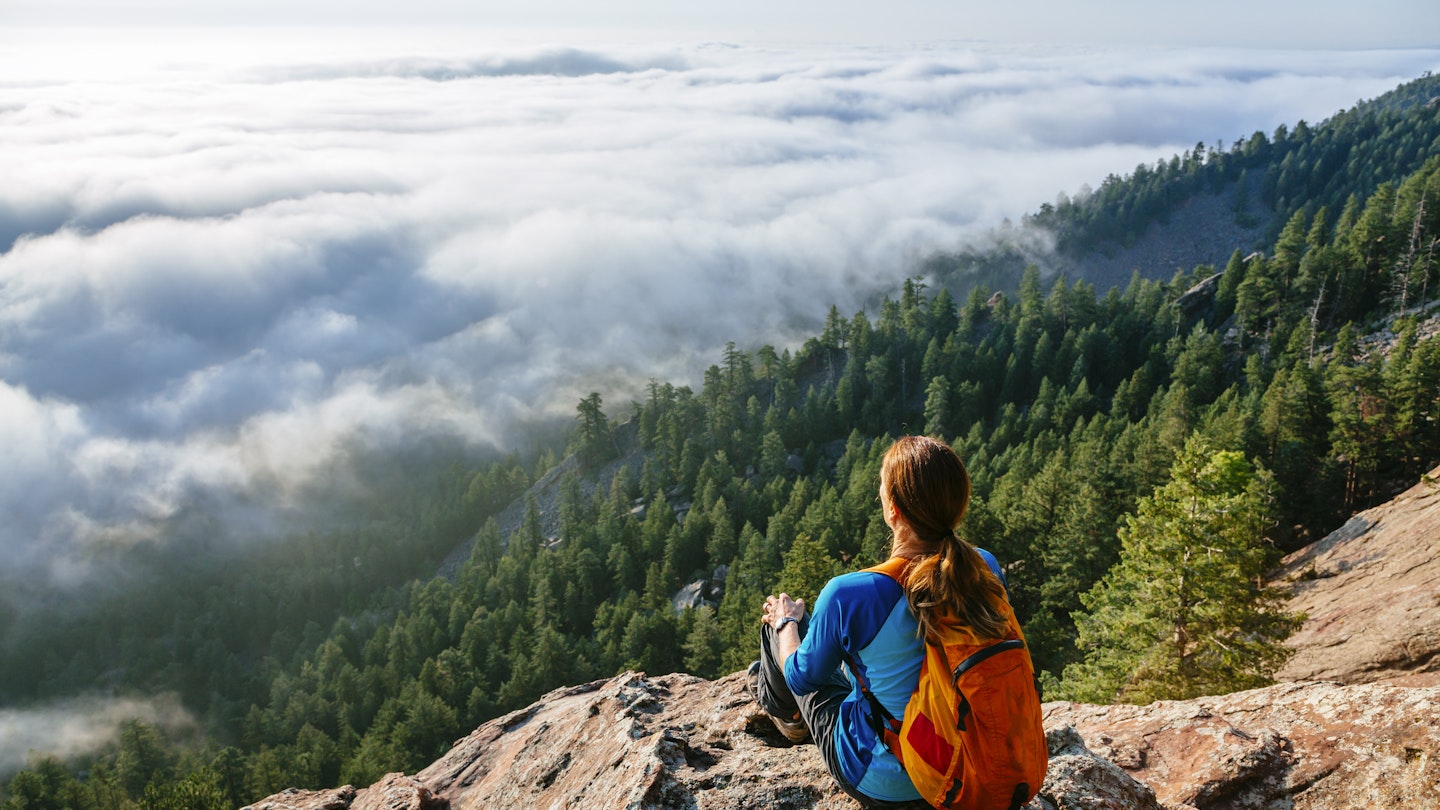Thanks to its stunning mountain views, over 300 days of sunshine, and thriving outdoor culture, Boulder feels like a special place year-round.
The population here is happy and healthy, and as a visitor, you can immerse yourself in this lifestyle from the moment you arrive. From trail tips to seasonal shifts to the local food and drink scene, here’s what you need to know before traveling to Boulder.
Planning Your Trip to Boulder
Bring Plenty of Layers
Boulder is known for its mild climate throughout the year, with low humidity, ample sunshine, and little rain. However, winters can get quite chilly, and in fall and spring, weather can be unpredictable—thunderstorms, flooding, high winds, and sporadic snowfall are all possible. Therefore, be sure to pack warm and water-resistant clothing for your outdoor adventures in Boulder.
Summer stands out as the only season when layers aren’t necessary, as temperatures can reach up to 100°F under the high-altitude sun. Nevertheless, you may want to bring a light rain jacket since Boulder occasionally experiences short summer thunderstorms.

Look Out for Accommodation Deals in Fall and Spring
Winter and summer attract crowds to Boulder, making those peak tourism times. Ski enthusiasts flock from New Year’s through March for nearby slopes, while summer brings outdoor events and ideal trail conditions. Consequently, accommodation and flight prices peak during these times. If you’re budgeting for your trip, consider visiting during spring or fall when fewer tourists are willing to brave the unpredictable weather, offering a more uniquely local experience of Boulder.
Plan Trail Activities for Early in the Day
Trail activities are among the most enjoyable things to do in Boulder, including hiking, biking, or trail running. Therefore, plan to head to the trailheads as early as possible, particularly on weekends. Many popular trails—such as those starting at Chautauqua Park or in Eldorado Canyon State Park—fill their parking lots by 10:00 AM on weekends. The earlier you arrive, the more likely you are to find parking and avoid the crowds.
Dining on Pearl Street
Pearl Street serves as the main thoroughfare and a key attraction in Boulder. This charming, pedestrian-only street is downtown’s heart, showcasing a variety of unique shops, eclectic bars, and top eateries. In the evenings, it’s the go-to place to grab a meal after a day filled with outdoor adventures.
Given that many restaurants on Pearl Street tend to be busy during dinner times, it’s advisable to make reservations in advance. Alternatively, you can put your name down at a restaurant and explore the shops while waiting for your table.
Etiquette in Boulder
Dress for the Trail—Just About Everywhere
With a notable active and outdoor culture in Boulder, locals often dress for outdoor activities. The trend comprises the latest outdoor gear for both genders, while “Boulder casual”—jeans and a comfortable shirt or blouse—remains the most common attire for business meetings and dining out. There’s no need for fancy or high-fashion clothing; you may feel out of place if you do.

Use the Bike Paths to Get Around
Exploring Boulder by bike is one of the most authentic experiences, thanks to over 300 miles of dedicated bikeways and a thriving cycling culture. Rent a bike or utilize public bike share kiosks, then hop on the Boulder Creek Path to enjoy the sun alongside local commuters.
Don’t Skip on the Brews
Boasting the fourth-highest concentration of breweries per capita in the nation and the highest in Colorado, Boulder is an excellent place to enjoy a cold one after a day of adventures. The lively craft beer scene allows you to bike between some of the city’s most popular breweries along the well-known Boulder Beer Trail.
A Town Shaped by the Buffs
A significant portion of Boulder’s population consists of college students attending the University of Colorado Boulder. Many congregate in student-heavy neighborhoods like University Hill, Martin Acres, and parts of Central Boulder, including Pearl Street. Consequently, students infuse a youthful energy into the city during the school year, while their numbers decline in summer, creating a more relaxed atmosphere for visitors.

Vegans and Vegetarians Are Welcome
Boulder’s food scene thrives on its status as a national hub for natural and organic producers. Surrounded by extensive farmlands, many local restaurants focus on organic, locally sourced ingredients. As a result, you’ll find plenty of dining options catering to vegan, vegetarian, and gluten-free diets—ideal for travelers with dietary restrictions. Be sure to try local favorites for a satisfying meal.
Health and Safety in Boulder
Wear a Helmet and Lock Up Your Bike
Biking around Boulder is a straightforward and enjoyable way to explore the city. To ensure your safety on two wheels, wear a helmet, use bike lights after dark, and always prioritize pedestrians. Ride with traffic in designated bike lanes and yield the right of way to other trail users while on mountain biking paths. Lastly, don’t forget to lock your bike—bike theft is not uncommon in Boulder.
Be Mindful on the Trails
With easy access to mountains and trails, many visitors come to Boulder for outdoor activities. However, trails can pose inherent dangers, so proper education and preparation are critical. Always stay on marked trails, hike with a group, and bring essentials like sunscreen, food, water, and a first-aid kit.
Before embarking on any outdoor activity, check the weather, and refrain from hiking during thunderstorms, snowstorms, or extreme temperatures. For emergencies, call Rocky Mountain Rescue, the primary search-and-rescue team in Boulder County.
Prepare for the Altitude
Sitting at 5,328 feet above sea level, Boulder’s elevation can affect travelers from lower altitudes. Symptoms like headaches, fatigue, or nausea might indicate altitude sickness. To avoid such issues, stay hydrated, consume alcohol in moderation, and limit salty foods, which can help your body adjust. For higher altitude hikes, take more breaks to catch your breath and consider using an oxygen canister, available in many local drugstores.




